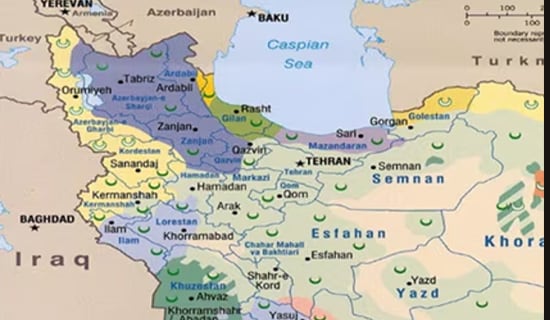After the Ukrainian military significantly pushed the Russians back in the Kharkiv and Kherson regions last autumn, advancing by 30-50 miles and liberating several crucial cities, the conflict turned into a "trench war," with the front stabilizing for around half a year.

(Source: Zn.ua)
A Ukrainian Counteroffensive Might Be Ill-Prepared
Russian mercenaries and troops, among whom are many reservists, are still attempting to capture a relatively small town of Bakhmut. All in all, they are suffering heavy losses and are having very limited successes. Russia's warfare certainly differs from that of the Soviet-era. In World War II, in just seven months, between 1943 and 1944, after the Red Army started its advance roughly in the same place where the Russian troops are today in Eastern Ukraine, the Soviet Union succeeded in reaching the borders with Romania pushing through all of Ukraine and Moldova. Today, I would argue that the potential for a large Russian advance is extremely limited, and the Kremlin might see the armistice that would recognize the status quo, as a very good result (as the Russian leaders are often saying, they are willing to negotiate peace, but " taking into account the current realities").[1]
Ukraine has instead prepared for the entire 2023 campaign by getting increasing amounts of Western financial and military assistance and securing crucial deals with NATO countries that involves supplies of modern tanks, artillery systems, missiles, and ammunition. The Ukrainian army consists of at least 350,000 to 400,000 troops[2] (several Ukrainian officials increase these estimates by up to 700,000 and even 1,000,000 servicemen)[3] and by many standards it is now the strongest military force in Europe. Its commanders realize quite well that they cannot afford huge losses and therefore are using Russian attempts to advance to annihilate their forces. If one were to compare the Bakhmut showdown with some other battles, I would of course remind the reader of the siege of Stalingrad, after which the Nazi armies began their continuous retreat from the Soviet territory. However, at this crucial point in the war, a radically new trend has emerged, as a Ukrainian counteroffensive might be ill-prepared and may produce little or no visible results, as the Russian defense lines are too solid to be easily penetrated.
Russian Army Suffered Enormous Loss
In the last two months, U.S. and European politicians argued that the Ukrainian counteroffensive might fail or yield little results due to insufficient armament supplies or a lack of experienced military commanders. Czech President Petr Pavel suggested that Ukraine will only have one attempt at a counteroffensive,[4] both because the casualties might be too high for another attempt and because Ukraine's allies may reconsider their readiness to help the country further.[5]
Meanwhile, Western policymakers dismissed Ukraine's claims about the slow supply of military equipment, saying that "we've nearly completed the requests of what [Ukraine] said they needed for the counteroffensive."[6] It is widely believed that Ukraine's accusations are aimed at shifting at least a part of responsibility for a potentially failure of the counteroffensive on the West, at the same time Western leaders are trying to decline any such responsibility). However, as time passes, the overall impression is that just a few Western politicians and analysts expect an impressive Ukrainian victory.
Nevertheless, I would argue that one should not be too pessimistic. All the assessments made in recent weeks seem to be based on the capacity of Ukrainian forces and on the amount of Western military supplies delivered – but to my mind, the most important points to be considered are Russia's fighting capabilities and the morale of the Russian soldiers, not to mention the Kremlin's "strategies".
During the last 14 months of war, the Russian army suffered enormous loss of both personnel and ammunition. The most realistic assessments estimate that the number of troops killed or critically wounded is between 100,000 and 150,000,[7] and the number of destroyed tanks and aircraft at 1,500 and 400, respectively.[8] Moreover, it needs to be mentioned that among those killed or incapacitated were at least 20,000 officers of all ranks,[9] which cannot be substituted either by reservists or by new trainees (just 10,000 officers graduated from the Russian military colleges in 2021).[10] The ammunition destroyed was maybe not the newest T-14 or Su-57, since these are produced in very limited numbers, but quite modern tanks and aircraft recently uplifted and equipped by Western-produced communication and precision devices. While the Russian leadership responded with new efforts in rejuvenating its military-industrial complex (in recent weeks even Ukrainian sources recognized that the enemy is now using brand-new missiles produced in Russia without relying on Western components),[11] the losses incurred in these months cannot be replenished. So the Russian army in general seems to be significantly weaker these days than it was at the start of the war, a fact that can be demonstrated by the fact that it has not been engaged in any offensives for more than half a year.
The Low Morale Of Russian Servicemen
However, the most important point to take into consideration is Russia's morale. While saying that around 100,000 Russian soldiers and officers were killed at the frontlines, and at least another 100,000 were seriously injured, one should realize who was called into the army to replace them. I would say that today the Russian troops consist of three different segments: the "regular" army, the mercenary groups like Wagner and maybe some less important ones, and Rosgvardia, i.e., the national guard, which seems to have not seen action since a year ago when it suffered large losses in Northern Ukraine. Furthermore, if one looks at the recent developments, it is clear that the battle for Bakhmut has been waged predominantly by the Wagner mercenaries, who lost several tens of thousands of their comrades in the fighting – or more than a half of those joining the group since the war started.[12] Wagner soldiers, most of them being pardoned prisoners, have their reasons to fight hard – both because they hope to get their freedom after six months of service and because their commanders can brutally execute them if they desert.[13] This capable part of the Russian force is deployed only on a small section of the front, representing less than 5 percent of its entire length, nevertheless it still suffers a lot from mismanagement and lack of ammunition.[14]
These days, a major part of the Russian army consists of the mobilized reservists, most of whom were either sent to the front against their will or appeared there because they signed a contract, being seduced by high salaries and possible "death money" or other kinds of compensation. In many cases, their wives and relatives encouraged them to go to war believing they would be able to earn money that was needed to repay their loans or to improve their living standards. This commercial element should not be underestimated since the remuneration offered by the Defense ministry exceeds the average salary in Russia's poorest regions by up to 10 times, and the "death money," if paid, may be as high as the region's average salary for 20 years.[15]
I believe that if the Ukrainians attack in any place except Bakhmut, they will face people treating the war as a high-paid commercial service or that were put to the frontline against their own will. To my mind, the issue of motivation is extremely important in modern war, and the morale of the Russian army is very low because the servicemen are treated as inferior people by their commanders,[16] are poorly equipped and not properly trained,[17] and were forced even to buy uniforms and medicine for themselves as they were mobilized. Some estimates suggest that more than a half of Russian soldiers' deaths resulted from not life-threatening wounds that were not properly handled.[18]
Such an army might be defeated much more easily than one that defends its homeland.
Putin's Plan Consists Of Increasing The Army's Ranks
There is one more point that should be mentioned: When the Russians retreated, they were faced in many cases (as had happened in the Soviet Army during World War II) with either the Rosgvardia battalions or Chechen paramilitaries that fire on them trying to hold them from retreating.[19] I would say that if this proliferates all over the frontline, serious conflicts may arise between Wagner and the army, and between the army and Rosgvardia as well. Yet, if the Russians start to flee, there would be few reasons that could stop them from retreating since the reserves are tiny and Russian President Vladimir Putin does not possess any levers for changing the situation. I would argue that it is no coincidence in the fact that, in recent weeks, Russian propaganda outlets were instructed about what should be said and written in case Ukraine's assault is successful and the Russian army is squeezed out of the currently occupied territories.[20]
The Kremlin now faces a difficult choice. On the one hand, Putin would like to continue pretending, as he did for all these months, that the war in Ukraine is waged by professionals and that the Russian public could continue its routine life – this has been one of the strongest arguments that made the people agree to the continuation of the conflict. On the other hand, the Kremlin wants to get more and more power to wage the war, and some advisors advocate the introduction of a state of emergency and martial law. However, this scenario would destabilize the overall political situation in the country.
As of today, Putin's plan consists in increasing the army ranks by another 400,000 contract soldiers by year's end,[21] but there is mounting evidence suggesting that both the Defense Ministry and the local authorities cannot meet this goal,[22] since ordinary Russians do not consider even the currently offered pay an attractive option. In St. Petersburg, the Governor's Office is pressing the owners of large industrial enterprises to deliver at least five "volunteers" from each company,[23] and such pressure will only grow as the number of those willing to serve declines.
Conclusion
To conclude, I would argue that Western analysts greatly overestimate the importance of new ammunition and state-of-the-art weapons in the upcoming attack. If one turns back to the Ukrainian advance in the Kharkiv region last September, it is possible to see that Russia, being pushed back for 50-70 kilometers,[24] abandoned three times more tanks than what the Ukrainian side has lost in action.[25] Russians never fully recovered from the initial attack.
The most important factor today is the morale of both armies and the capabilities of their commanders to lead their troops (it should be mentioned that Russia almost never tried to maneuver in this war, while Ukraine gained most of its victories through breaking the Russian defense and endangering the enemy by encirclements and cutting off their supply lines),[26] and not so much the number of tanks and artillery systems. Of course, I can be mistaken, but I think the Ukrainian counteroffensive has a huge chance of succeeding, leading to the expulsion of Russian troops from the entire Ukrainian territory.
*Dr. Vladislav Inozemtsev is a MEMRI Russian Media Studies Project Special Advisor, and Founder and Director of the Moscow-based Center for Post-Industrial Studies.
[1] Nsn.fm/policy/lavrov-peregovory-s-ukrainoi-sostoyatsya-tolko-na-osnove-ucheta-interesov-rossii, April 7, 2023.
[2] Topcor.ru/32305-kakova-realnaja-chislennost-armii-zelenskogo.html, February 20, 2023.
[3] Ria.ru/20220521/ukraina-1789902083.html, May 21, 2022.
[4] Rp.pl/polityka/art38151711-wielka-kontrofensywa-prezydent-czech-ukraina-bedzie-miala-tylko-jedna-probe, March 19, 2023.
[5] Theconversation.com/why-ukraines-fate-rests-on-its-imminent-counteroffensive-204900, May 3, 2023.
[6] Politico.com/news/2023/04/24/biden-ukraine-russia-counteroffensive-defense-00093384, April 24, 2023.
[7] Eurointegration.com.ua/rus/news/2023/01/20/7154576/, January 20, 2023.
[8] Eurointegration.com.ua/rus/news/2023/01/20/7154576/, January 20, 2023.
[9] Bbc.com/russian/features-62599928, August 19, 2022.
[10] Mk.ru/politics/2021/06/19/v-voennykh-vuzakh-minoborony-proshel-massovyy-vypusk-oficerov.html, June 29, 2021.
[11] Zn.ua/war/rossija-bet-po-ukraine-svezhimi-raketami.html, April 29, 2023.
[12] Hvylya.net/news/271784-v-belom-dome-nazvali-poteri-okupantov-pod-bahmutom, May 2, 2023; Currenttime.tv/a/ukraine-russia-war-prisoners/31995744.html, August 19, 2023.
[13] Pravda.com.ua/rus/news/2022/11/13/7376139/, November 13, 2022.
[14] Meduza.io/news/2023/05/05/shoygu-gerasimov-gde-suka-boepripasy-prigozhin-matom-naoral-na-rukovodstvo-minoborony-rf-na-fone-trupov-naemnikov-chvk-vagnera, May 5, 2023.
[15] Rbc.ru/politics/03/03/2022/6220f5d49a7947c4523debfe, March 3, 2022.
[16] Sibreal.org/a/kak-rossiyskih-voennyh-izbivaet-i-ugrozhaet-ubit-sobstvennoe-komandovanie/32281743.html, March 3, 2023.
[17] Kasparov.ru/material.php?id=633E7191CCB25, October 6, 2022.
[18] Glavcom.ua/ru/think/vysokaja-smertnost-okupantov-bolshe-poloviny-umiraet-ot-banalnoj-prichiny-923960.html, May 1, 2023.
[19] 24tv.ua/ru/zagraditelnye-otrjady-kak-rabotajushhie-i-streljajushhie-rossijanam-v-spinu-24-kanal_n2191715, November 4, 2022.
[20] Meduza.io/feature/2023/05/02/esli-ukraina-dostignet-uspehov-i-zaymet-territorii-ih-poterya-budet-ob-yasnima, May 2, 2023.
[21] Thebell.io/kak-vlasti-hotyat-nabrat-400-tysyach-kontraktnikov-chto-gosudarstvo-uznaet-ob-uklonistah-i-pochemu-investory-razlyubili-kosmos, April 21, 2023.
[22] Muksun.fm/news/2023-04-07/v-hanty-mansiysk-prishla-raznaryadka-o-nabore-voennosluzhaschih-po-kontraktu-2897082, April 7, 2023.
[23] Kommersant.ru/doc/5968226, May 4, 2023.
[24] Telegraf.news/world-news/ukraincy-prodvinulis-na-70-kilometrov-za-5-dnej-isw-prognoz-ekspertov-chto-budet-dalshe-pod-harkovom-i-dazhe-lisichanskom/, September 11, 2022.
[25] Meduza.io/feature/2022/09/10/rossiya-poterpela-v-harkovskoy-oblasti-samoe-krupnoe-porazhenie-v-voyne-s-ukrainoy-no-vozmozhno-eto-esche-ne-konets-nastupleniya-vsu, September 10, 2022.
[26] Dw.com/ru/v-dnr-podtverdili-othod-rossijskih-vojsk-iz-izuma/a-63077202, September 10, 2022.








